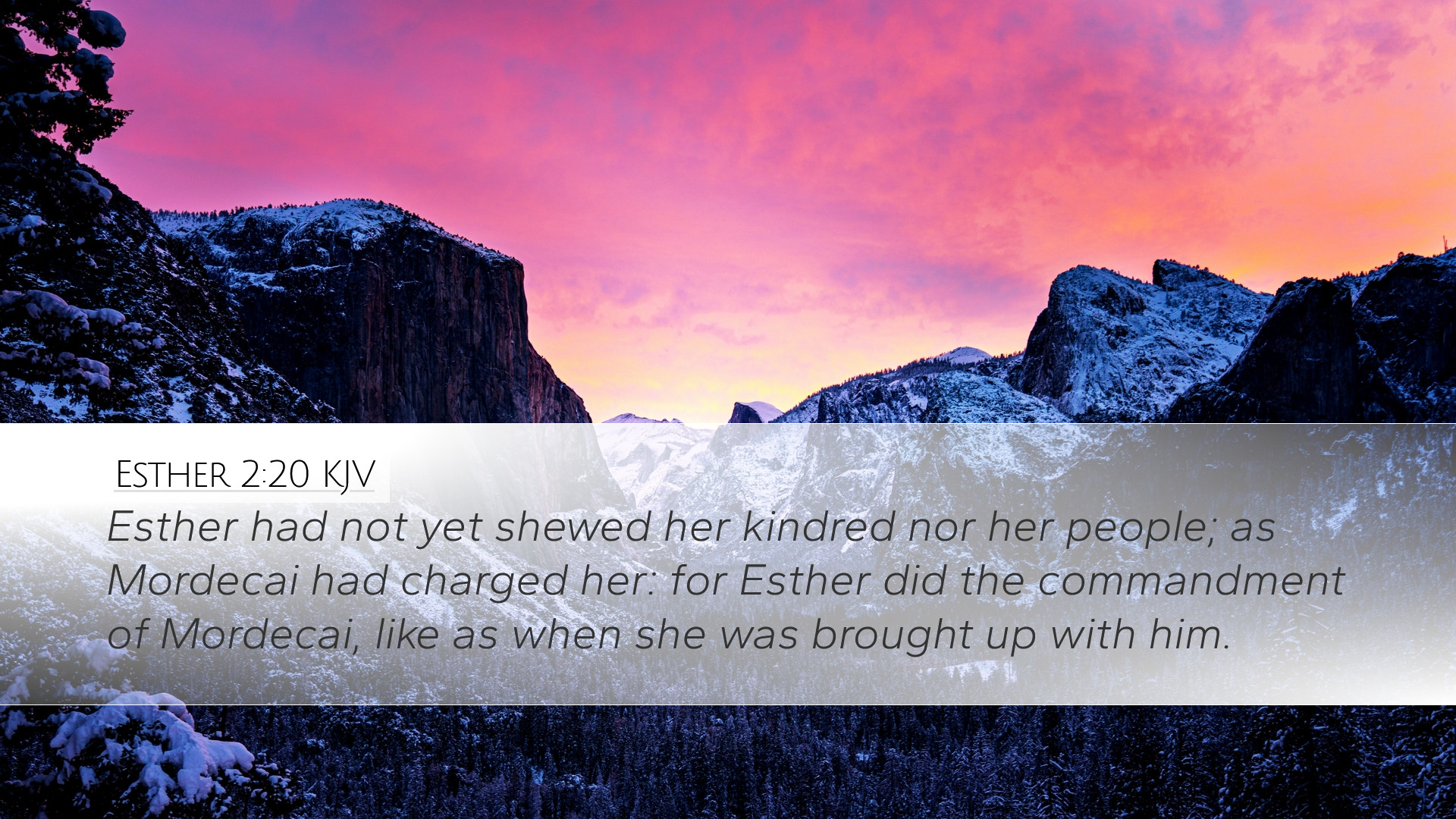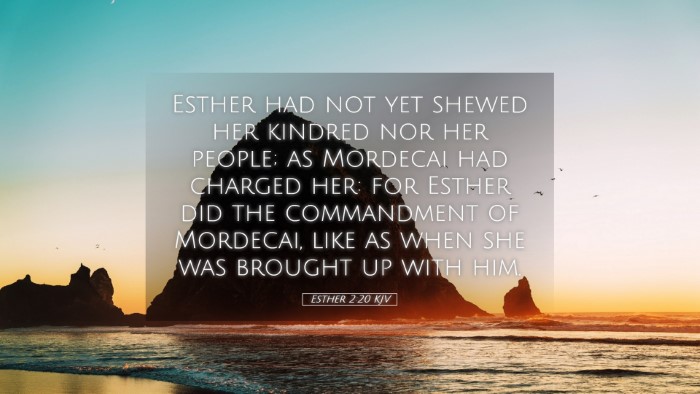Old Testament
Genesis Exodus Leviticus Numbers Deuteronomy Joshua Judges Ruth 1 Samuel 2 Samuel 1 Kings 2 Kings 1 Chronicles 2 Chronicles Ezra Nehemiah Esther Job Psalms Proverbs Ecclesiastes Song of Solomon Isaiah Jeremiah Lamentations Ezekiel Daniel Hosea Joel Amos Obadiah Jonah Micah Nahum Habakkuk Zephaniah Haggai Zechariah MalachiEsther 2:20
Esther 2:20 KJV
Esther had not yet shewed her kindred nor her people; as Mordecai had charged her: for Esther did the commandment of Mordecai, like as when she was brought up with him.
Esther 2:20 Bible Commentary
Commentary on Esther 2:20
Bible Verse: Esther 2:20 - "Esther had not yet made known her kindred nor her people; as Mordecai had charged her: for Esther did the commandment of Mordecai, like as when she was brought up with him."
Introduction
The verse in Esther 2:20 serves as a pivotal moment in the narrative, illustrating themes of obedience, identity, and the unfolding divine plan. This commentary synthesizes insights from renowned public domain scholars such as Matthew Henry, Albert Barnes, and Adam Clarke, offering a detailed examination of this crucial text.
Contextual Analysis
Esther is set against the backdrop of the Jewish diaspora in Persia, a context rich with cultural tensions and identity challenges. The events surrounding Esther's rise to prominence in King Ahasuerus’s court are laced with God's providential orchestration.
Historical Background
In the context of the Babylonian captivity and subsequent Persian rule, the Jewish people faced the dual challenge of maintaining their cultural identity while navigating life in a foreign empire. Esther’s story is a testament to how individuals can influence the course of history while silently bearing the weight of their heritage.
Thematic Insights
The Role of Obedience
Mordecai’s guidance is critical; Esther's compliance not only highlights her respect for familial authority but also underscores the vital nature of obedience in biblical narratives.
- Matthew Henry emphasizes that Esther’s adherence to Mordecai's instructions reflects wisdom and discretion, qualities necessary for her survival and success in an adversarial environment.
- Albert Barnes points out that Esther's silence regarding her Jewish identity serves a strategic purpose, suggesting that sometimes restraint is necessary for greater outcomes.
- Adam Clarke discusses the notion of covenant loyalty, suggesting that Esther's actions signify the importance of communal identity, even if initially hidden.
Identity and Influence
Esther's concealed identity serves as a metaphor for the hidden ways in which God orchestrates events for His purpose. Her Jewish heritage, though initially unspoken, positions her as a significant figure in God's redemptive plan for His people.
- Henry notes that her unwillingness to disclose her lineage exemplifies a strategic approach to influence, a reminder that power can manifest through subtlety.
- Barnes reminds us that knowledge of one's heritage can empower individuals but at times, discretion may serve a higher purpose in divine providence.
- Clarke highlights how this narrative illustrates the journey of identity, reflecting the complexities faced by those who live in cultural intersections.
Theological Implications
Esther 2:20 opens avenues for rich theological reflection. The interplay of divine guidance, human agency, and the importance of obedience emerges as key themes.
Divine Providence
Just as Esther's actions were instrumental in the delivery of her people, so too can contemporary believers recognize the role of divine providence in their lives.
- Henry: God's hand is evident even when invisible, prompting believers to trust in His plan amidst uncertainties.
- Barnes: Encourages the notion that God works through ordinary events; Esther’s hidden identity is part of a larger tapestry of divine purpose.
- Clarke: Suggests that faithfulness in small matters can lead to greater responsibilities in God's kingdom.
Lessons on Leadership
Esther's life can serve as a model for leadership. Her story invites pastors and leaders to reflect on how they can balance authority with humility, influence with integrity, and identity with obedience.
- Henry indicates that effective leadership often requires patience and understanding of the broader situation.
- Barnes calls attention to the power of quiet influence, highlighting that true leadership does not always seek recognition.
- Clarke discusses how God's purposes advance through those who, like Esther, remain faithful in the mundane.
Conclusion
Esther 2:20, while brief, is densely packed with implications for faith and practice. The obedience of Esther, as guided by Mordecai, serves as a powerful illustration of how personal identity and divine purpose intersect amidst adversity. Today, the insights drawn from this passage challenge believers to recognize their roles in God's overarching narrative while encouraging them to remain faithful to their heritage and calling.


